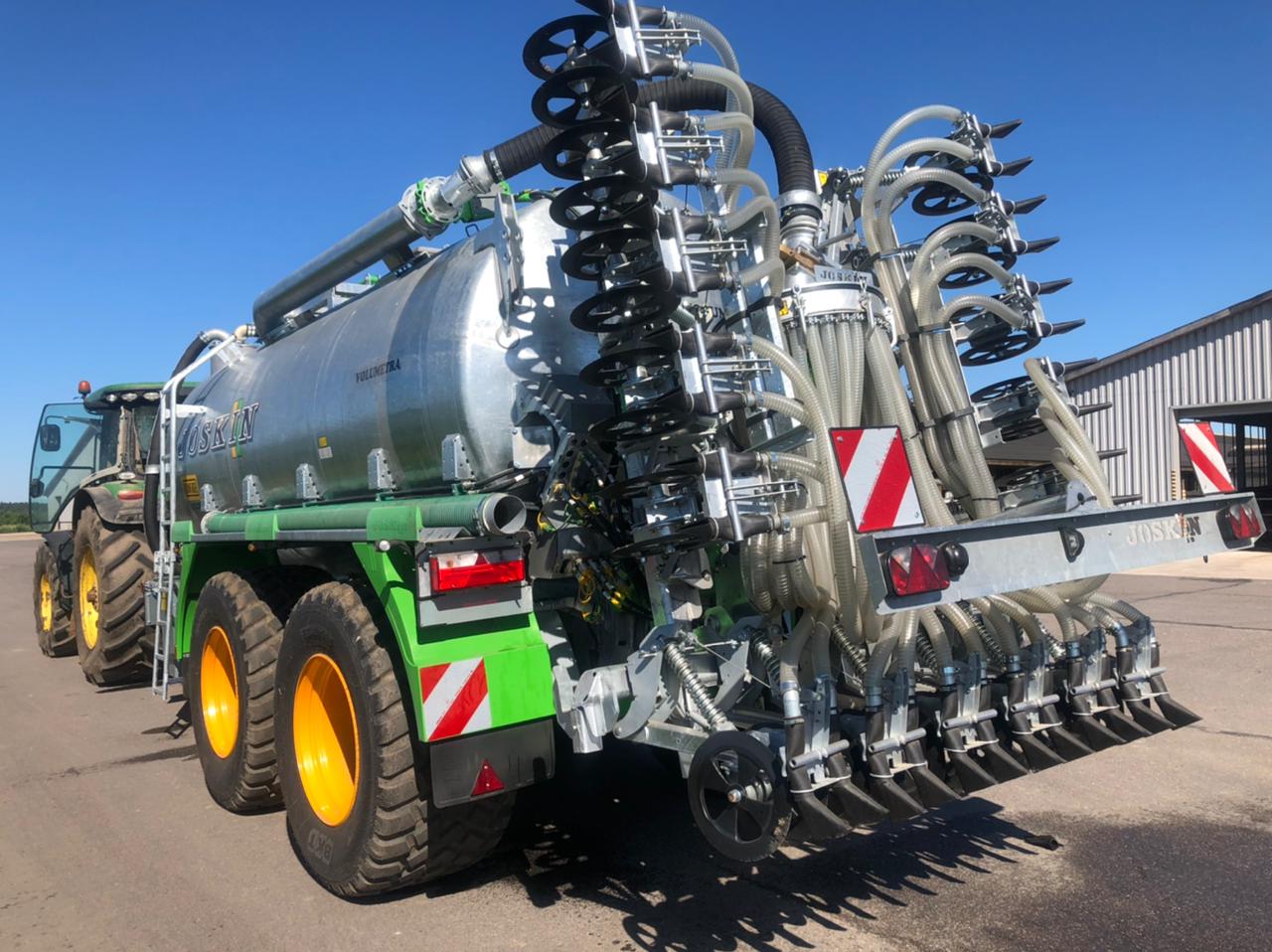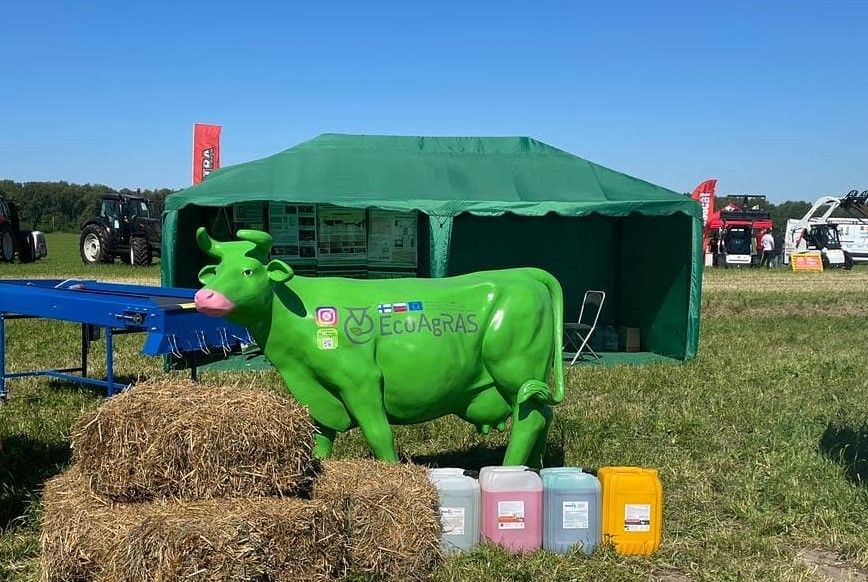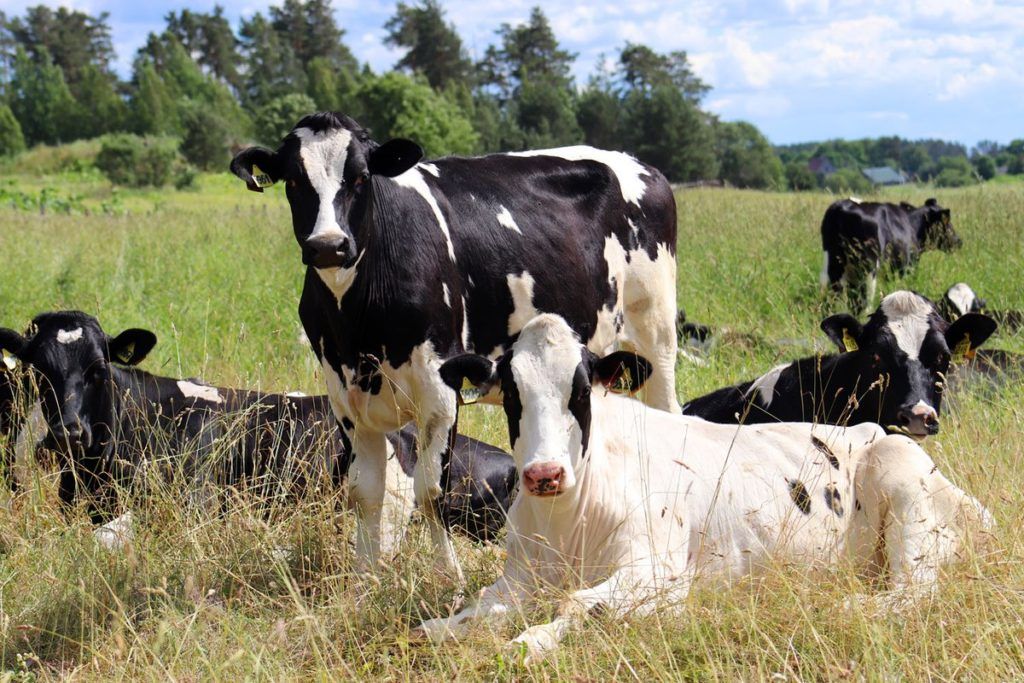Processed cattle manure is a good deal for the environment
Did you know that cattle manure is not the same as organic fertilizer? To become a nutrient substance for plants, it must be correctly processed, stored and spread. Otherwise, it may negatively impact the environment – air, soil and water. Excessive amounts of manure produced by large-scale livestock farms in the Leningrad region (Russia) bear environmental risks for the eco-systems in the Baltic Sea region. The ECOAGRAS project introduces best available technologies for handling organic cattle waste, with the aim to reduce environmental impact while securing the economic activity.
Russia and Finland have different approaches to farming. Whereas in Finland prevail small-scale farms, which join efforts to produce gross product, Russia keeps up the strategy of large-scale livestock enterprises. They are the trouble spots for environment: large amounts of manure are produced daily regardless of the season, while the vegetative period – the period when manure can be transported to the fields – is quite short. The proximity of livestock farms to large water bodies increases environmental risks in the cross-border region. That is why farming needs rational solutions – solutions which do not threaten food security – for sustainable environmental governance.
“It is important to understand that environmental protection is as important as economic activity, because at a certain moment our “free eco-system services” – such as the capacity of water to self-purification – will become a very expensive resource, close to the state of no return”, – says Ekaterina Vorobyeva from the Institute of Agroengineering and Environmental Problems of Agricultural Production, lead beneficiary of the ECOAGRAS project. The initiative – implemented within the framework of the South-East Finland – Russia CBC programme – introduces best available technology for handling organic cattle waste to the pilot farm “Pervomaisky”, a large plant in the Leningrad region counting over 2.000 cattle.
 “Pervomaisky” is divided into two parts: the upper site accommodates cowsheds, the lower one includes the project construction site. Cattle manure will be collected at the upper site and split into the solid and liquid fractions on the lower site. The solid fraction will be processed in the bio fermenter to become organic fertilizer. The liquid part will be transferred via the pipelines into the four sealed storage tanks. The closed system will exclude any contact of manure with the atmosphere and prevent emissions”, – explains the infrastructure works Ekaterina – Our aim is to demonstrate that this rational system is the best available technology: it is advanced, easy to construct and manage, and – most important – it minimises impacts on the environment. In this, we appreciate a lot the experience of our Finnish colleagues: they participated in the development of the technical specification for the site, and provided consultations”.
“Pervomaisky” is divided into two parts: the upper site accommodates cowsheds, the lower one includes the project construction site. Cattle manure will be collected at the upper site and split into the solid and liquid fractions on the lower site. The solid fraction will be processed in the bio fermenter to become organic fertilizer. The liquid part will be transferred via the pipelines into the four sealed storage tanks. The closed system will exclude any contact of manure with the atmosphere and prevent emissions”, – explains the infrastructure works Ekaterina – Our aim is to demonstrate that this rational system is the best available technology: it is advanced, easy to construct and manage, and – most important – it minimises impacts on the environment. In this, we appreciate a lot the experience of our Finnish colleagues: they participated in the development of the technical specification for the site, and provided consultations”.
With the infrastructure works almost completed, the partners are planning to launch the pilot site in September: the inauguration will be dedicated to the big agricultural event – the International agro-industrial exhibition and trade fair “AGRORUS”, during which the project partners will invite the exhibition participants to visit the pilot site.
Of course, it is important not only to launch the new infrastructure but also to demonstrate its environmental effectiveness. “We are already monitoring water, soil and air around the farm as a preventive measure, – says Ekaterina. – However, the most interesting phase of monitoring will start when the pilot system is in place. In the frame of the project, we have purchased two modern hi-tech machines to spread the liquid fraction of manure in the fields. We are going to monitor gross emissions of the greenhouse gases, ammonia, acid nitrogen, etc. in the air, comparing the measurements from three farm fields: in two fields, manure will be spread traditionally; in the third one – by the new machines. The measurements should demonstrate that modern equipment considerably reduces the emissions compared to the traditional methods”.
effectiveness. “We are already monitoring water, soil and air around the farm as a preventive measure, – says Ekaterina. – However, the most interesting phase of monitoring will start when the pilot system is in place. In the frame of the project, we have purchased two modern hi-tech machines to spread the liquid fraction of manure in the fields. We are going to monitor gross emissions of the greenhouse gases, ammonia, acid nitrogen, etc. in the air, comparing the measurements from three farm fields: in two fields, manure will be spread traditionally; in the third one – by the new machines. The measurements should demonstrate that modern equipment considerably reduces the emissions compared to the traditional methods”.
Even if the improvement of infrastructure targets one single farm, the project sets a strategic vision on the manure management in the Leningrad region. A new interactive tool has been recently developed by the project’s lead beneficiary to monitor the producers of organic fertilizers and coordinate distribution between the consumers. It displays the current state-of-play of the agricultural organizations based on various parameters: location, livestock population, available equipment, technological solutions for processing manure into organic fertilizer, amounts of organic fertilizers produced, available agricultural land for the spread of organic fertilizers, etc. The tool can display the missing equipment, the districts lacking or excessing organic fertilizers, the distances between producers and consumers, the financing required to ensure the uniform distribution, etc. The tool is primarily targeting the regional authorities (Agro-Industrial Complex Committee of the Leningrad Region) because it allows to systemize a large amount of available information in a simple and comprehensive way which significantly facilitates decision-making for sustainable agriculture governance. “Our tool gives a possibility to focus economic efforts in order to reach the maximum ecological effect,” – resumes Ekaterina.
In the long-term, the project will have a strong capacity-building and educational effect. The pilot site will be used as a demonstration platform for the farm owners, specialists, and regional authorities, where they will be able to examine the infrastructure, see the process and ask questions. The first excursion for over 40 specialists and graduates took place already in May.
Even in the time when physical visits to the object are limited because of the pandemic, the project partners have never stopped communicating with their target audiences. A large set of online tools helps them to interact, build capacities and raise awareness on sustainable agriculture among small farmers, students and graduates, civil society. “Due to the lockdown we had to transfer our physical events online, however, trying to maintain the feeling of affection and togetherness which can be created during face-to-face meetings. We have wanted to make our target groups “feel” our pilot site. Thus, we have tried drone shooting broadcasted live, at the same time we were communicating with our participants, answering their questions and explaining the scene. Another online initiative is “The School of Farmers” – a series of webinars, Zoom meetings, discussion clubs for students in which our Finnish colleagues often participate as speakers, to share their experience and to answer questions”, – says Ekaterina.
The EcoAgRas project brings many benefits. In addition to the tangible reduction of the negative environmental impact in the border areas, it also increases the level of satisfaction among the local population: from a potential pollutant it turns into a model farm whose activity does not affect the living conditions in the rural area. And this is just the beginning: the next idea of the project partners is to develop a centralized distribution of organic fertilizers in the Leningrad region. Good luck!

